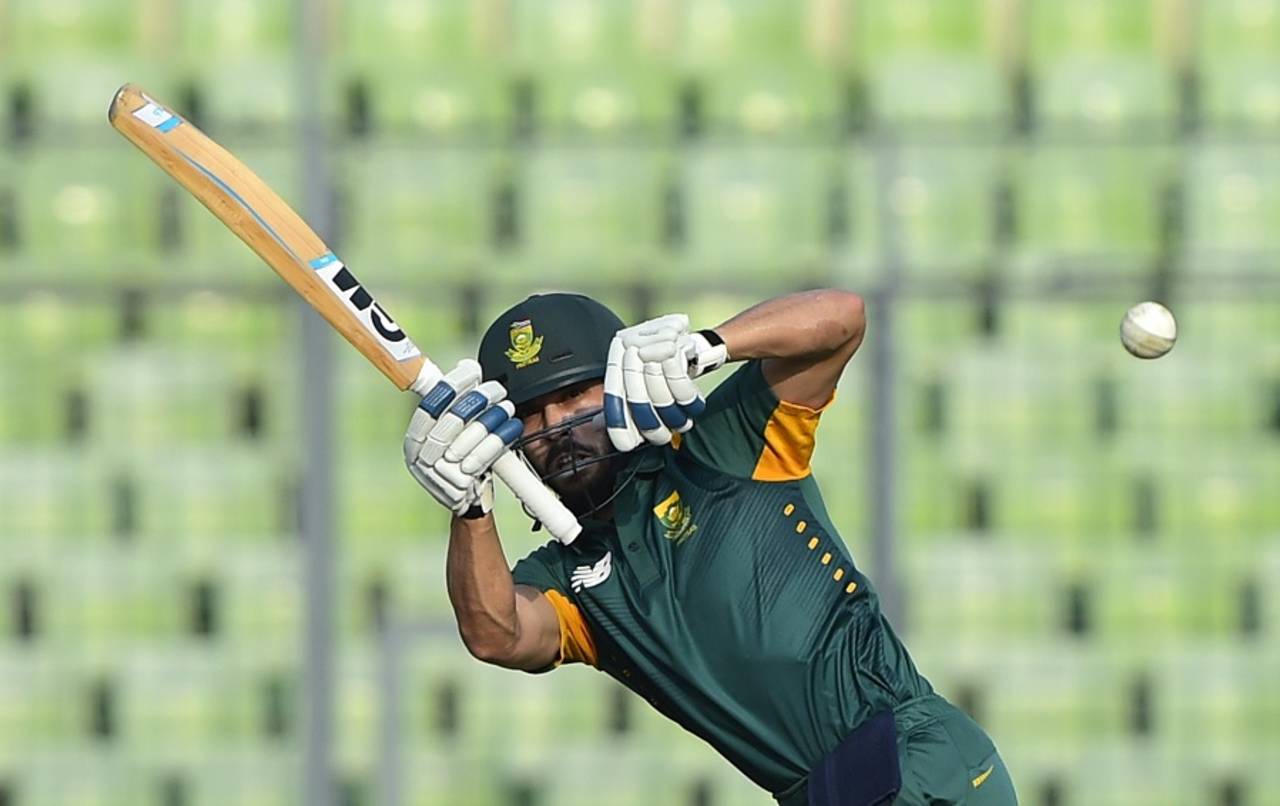The finisher and the fine-tuner
While their performances in India weren't the most eye-catching, Farhaan Behardien's all-round competence and coach Russell Domingo's hours of homework were vital to South Africa's limited-overs success
Firdose Moonda
26-Oct-2015

This year, Farhaan Behardien has played 20 ODIs, batted 15 times, and averages 40.00, with a strike rate of 104.16 • AFP
Summertime and the living is easy... at least if you're South African. Two series, two wins and that's before you've realised where those contests were, who they were against and what they were the precursor to.
For the record, it was against India in India in the first three weeks of a ten-week tour. South Africa's wins included a first-ever T20 series victory in their first-ever T20 series in India and a first-ever bilateral ODI series win in five attempts. So yes, it was pretty damn special and it came with all the frills and fireworks a special occasion merits.
There were the three captain's knocks from AB de Villiers, one a heroic hundred in a losing cause, there was the consistency from the old hand, Faf du Plessis, that eventually blossomed into an innings of craft and cramp, there was the redemption of Quinton de Kock, who announced himself as an international cricketer against India again and there was the revelation of Kagiso Rabada who proved pace is pace and nothing compares. If you had been following the series at all you already know all those things and you also know that while they are the standout reasons South Africa won, they are not the only reasons.
South Africa won because around de Villiers, du Plessis, de Kock and Rabada, there were others, chiefly Farhaan Behardien and Russell Domingo. The finisher and the fine-tuner have played silent roles in South Africa's success and it's time to make some noise about them.
Behardien was South Africa's fourth-highest run-scorer, ahead of Hashim Amla and JP Duminy (although Duminy missed the last two matches with injury) and has reached a level of consistency expected of a lower-order batsman. He is no Kieron Pollard - he is only about half the size - but he has become the finisher David Miller was supposed to be. In this series, he scored 124 runs and boasted an average of 41.33, thanks to two unbeaten scores and this year, he has played 20 ODIs, batted 15 times and averages 40.00, with a strike rate of 104.16.
Add to that the fact that Behardien can bowl some of the fifth bowler's overs. Although he was not a strike bowler, he had an economy rate of 6.15, marginally better than Duminy's 6.71, which meant South Africa did not have to force the issue of a seam-bowling allrounder, especially since it seems they don't have too many options. Including Chris Morris or David Wiese, who missed this series with injury, runs the risk of shortening the batting line-up but South Africa may not have to do that if they can put their trust in Behardien.
Like Ryan McLaren, Behardien has had his doubters and in the same way McLaren did, he has benefitted from consistency in selection and silenced them. Behardien understands he may not be the next superstar and has made peace with his limitations. Teams need people like that as much as they do the big names.
Someone who knew that all along was Domingo. In fact, he knew it so well that when he saw he was not going to add value as a cricketer - and that was way back when Domingo was still a club player - he decided to become a coach instead. That was 18 years ago, when the concept of the international coach was not as limited to the former player as it is now. These days, the prevailing opinion is that a Gary Kirsten or an Andy Flower can offer more than a Domingo or a Mike Hesson, but both are steadily proving the stereotype wrong.
In his two-and-half-years in charge, Domingo has already gone where no other South African coach has gone before. He is the only one to have won a World Cup knockout game. Before this tour, he had been in charge for 14 ODI and nine T20 series and South Africa had won eight of the former and two of the latter. That may not immediately sound impressive but it included victories in Sri Lanka in both formats, in New Zealand, in the UAE and at home. They have done all of that while going through waves of change that have included the retirements of some of the stalwarts.
Domingo has overseen the transition by sticking to a simple strategy of trusting the numbers but adjusting the gameplan to suit conditions. He does his homework before South Africa play and although knowing the ground average won't help a team win a game, it will tell them whether they are on the right track. Knowing that spinners have done better than seamers from a particular end or that slower-ball bouncers are better options than yorkers at the death somewhere is also valuable insight.
These days, South Africa speak with authority on those aspects of the game they may previously have simply admitted to not knowing much about. They tell local media that they expect bounce when everyone is gazing at a pancake or that the new playing conditions mean they are more likely to use short balls later on so they can have men caught at deep midwicket. That kind of thinking is Domingo's and it has become South Africa's. They enjoy being more informed and take pride in the nerdishness.
After all, in a typical South African summer time, the living is often easier for those who got through the end-of-year exams knowing they had passed than for those anxiously awaiting the outcome. And right now, South Africa are top of the class.
Firdose Moonda is ESPNcricinfo's South Africa correspondent